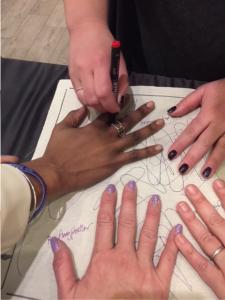I personally think part of the reason she is so popular is because Barbara Brown Taylor has the guts (and the word-smithing talent) to say what we  all think inside but either can’t or won’t express out loud.
all think inside but either can’t or won’t express out loud.
Her recent book, Leaving Church, is different from her other books (it’s a memoir) but she accomplishes the same gutsy truth-telling here. Maybe she voices what only professional clergy feel, but I suspect her words are not limited to those of us who call ourselves religious professionals.
Here she writes about what the professional role felt like to her. Take a read of this excerpt and see what you think:
“In my role, I could act out of my best nature for hours at a time. I could produce kindness when all I feel is fatigue. I could present patience when circumstances warrant irritation. I could shine like the sun until long after dark when I need to, but my soul did not operate on a solar calendar. My soul operated on a lunar calendar, coming up at a different time every night and never looking the same two nights in a row.
Where my role called for a steady circle of bright light, my soul waxed and waned. There were days when I was as full as a harvest moon and others when not so much as a sliver appeared in the sky. My soul’s health depended on the regular cycle of these phases. I needed the dark nights that gave the stars their full brilliance as much as I needed the nights when the moon shone so brightly that I could make shadow puppets with my hands.
The problem with the collar was that it did not allow for such variations. It advertised the steady circle of light, not the cycles, so that it sometimes scorched my neck.
I do not think that I was the only one who suffered from too much sun in church. One thing that had always troubled me was the way people disappeared from church when their lives were breaking down. Separation and divorce were the most common explanations for long absences, but so were depression, alcoholism, job loss, and mortal illness. One new widow told me that she could not come to church because she started crying the moment she sat down in a pew. A young man freshly diagnosed with AIDS said that he stayed away because he was too frightened to answer questions and too angry to sing hymns. I understood their reasoning, but I was sorry that church did not strike these eclipsed souls as a place they could bring the dark fruits of their equally dark nights.
Some of them returned when their moons had filled out a little and others did not, but even people in no apparent crisis seemed to suffer from the full-sun effect. As enjoyable as it could be to spend a couple of hours on Sunday morning with people who were at their best, it was also possible to see the strain in some of the smiles, the effort it took to present the most positive, most faithful version of the self. Sometimes I could almost read the truth written out above people’s heads. ‘Please don’t believe me. This is only a shard of who I really am.’ The cost of the pretense was the loss of the real human texture underneath, but since we all thought that was what was expected of us, that was what we delivered . . . .
I had set out to wear a collar in the first place because I thought it would mark me as someone committed to going all the way with God. Will you seek and serve Christ in all persons, loving your neighbor as yourself? My initial answer had been yes, I would. I would give myself completely to that ministry . . . . While I knew plenty of clergy willing to complain about the high expectations and long hours, few of us spoke openly about the toxic effects of being identified as the holiest person in a congregation. Whether this honor was conferred by those who recognized our gifts for ministry or was simply extended by them as a professional courtesy, it was equally hard on the honorees.
Those of us who believed our own press developed larger-than-life swaggers and embarrassing patterns of speech, while those who did not suffered lower back pain and frequent bouts of sleeplessness.
Either way, we were deformed.
We were not God, but we spent so much tending the God-place in people’s lives that it was easy to understand why someone might get us confused.” (pages 147-150)











